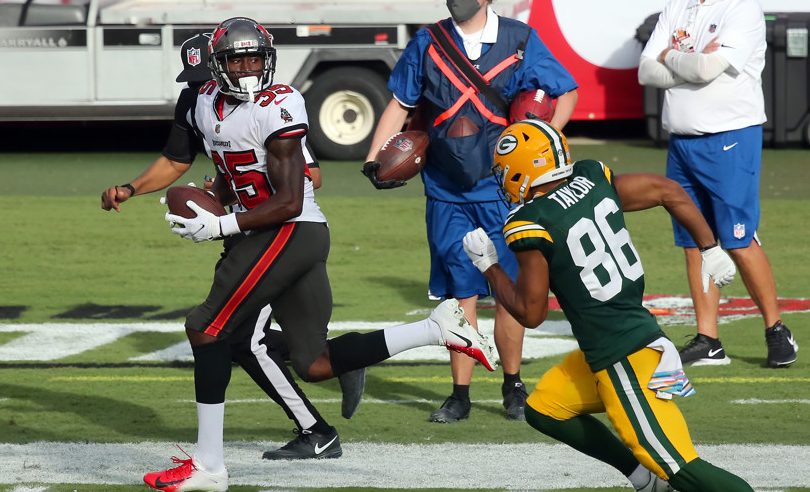NFL Betting: Do Big Interception Games Create Future Betting Value?
October 24, 2020 - by Jason Lisk

Jamel Dean is just one of three players to ever score on a pick six of Aaron Rodgers (Photo by Cliff Welch/Icon Sportswire)
Interceptions are impactful events within a football game. They are often one of the biggest swing plays in a game, taking a potential scoring possession away from one team, giving it to their opponent (perhaps in great field position), and maybe even yielding an immediate opponent score in the case of a pick-six.
Because they are rare events, though (that is, compared to how frequently teams pick up first downs, complete passes, or throw incompletions), the impact of interceptions on a game-by-game basis is subject to a significant luck factor.
In this post, we examine what happens after games in which one NFL team throws 3+ interceptions — a fairly high number that only happens in around 10% of games. We’ll not only consider the team that threw the interceptions, but also the team that did the intercepting.
How Teams Throwing Three or More Interceptions Did the Next Week
Since the 2013 season, excluding Week 17 games (since the regular season ends after that week), over 200 games featured a team that threw three or more interceptions. That’s an average of just over 30 games per season.
Here’s how teams did both straight up and against the spread the game after a bad interception performance.
Team Performance the Game After Throwing 3+ Interceptions, By Year
| Year | W | L | T | Win Pct | ATS W | ATS L | ATS T | ATS Pct |
|---|---|---|---|---|---|---|---|---|
| 2020 | 1 | 6 | 0 | 0.143 | 4 | 3 | 0 | 0.571 |
| 2019 | 13 | 23 | 0 | 0.361 | 15 | 20 | 1 | 0.431 |
| 2018 | 14 | 15 | 0 | 0.483 | 13 | 16 | 0 | 0.448 |
| 2017 | 10 | 21 | 0 | 0.323 | 8 | 23 | 0 | 0.258 |
| 2016 | 10 | 15 | 0 | 0.400 | 10 | 14 | 1 | 0.420 |
| 2015 | 16 | 11 | 0 | 0.593 | 12 | 15 | 0 | 0.444 |
| 2014 | 10 | 16 | 0 | 0.385 | 14 | 12 | 0 | 0.538 |
| 2013 | 16 | 22 | 2 | 0.425 | 19 | 21 | 0 | 0.475 |
| 90 | 129 | 2 | 0.412 | 95 | 124 | 2 | 0.434 |
It’s not a big surprise that teams that throw a lot of interceptions in one week tend to lose their next game more often than not. In general, teams that are losing games tend to throw more interceptions, partly because they need to take more risks in an effort to catch up.
In addition, teams that are losing games tend to be worse teams. So on balance, you’d expect them to be underdogs more often than not.
What is mildly surprising, though, is how poorly teams that threw a lot of interceptions did the following week against the spread, covering only 43% of the time.
We’ll dig into this observation more in a bit, but first let’s move to the other side of the equation: the teams that did the intercepting.
How Teams Benefiting From Three or More Interceptions Did the Next Week
The table below also includes data back to the 2013 season, and represents the results the game after a team intercepted at least three opponent passes.
Get access to all betting content, picks and models
Free subscription offers now available!
Already a premium subscriber? Sign in for access
Printed from TeamRankings.com - © 2005-2024 Team Rankings, LLC. All Rights Reserved.